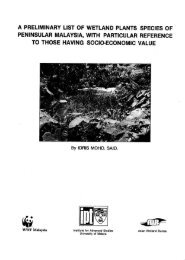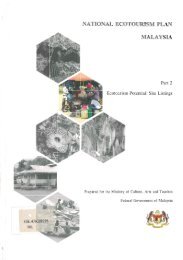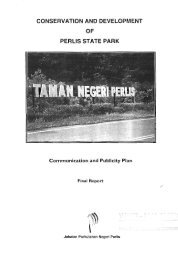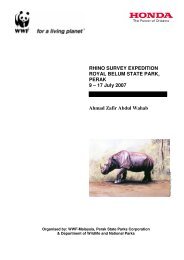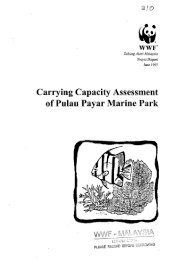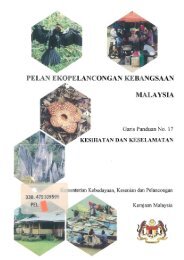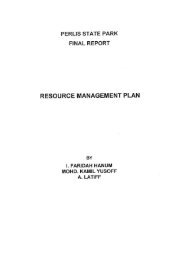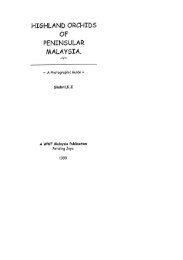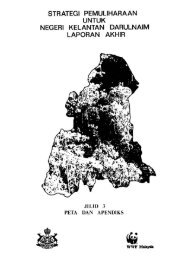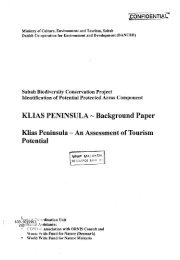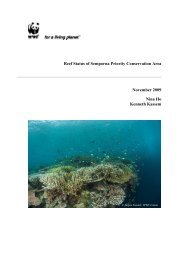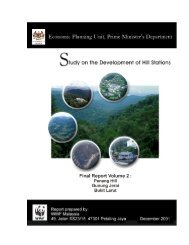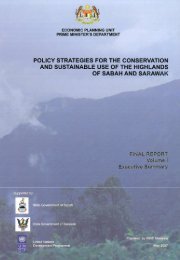FINAL VERSION FOR APPROVAL - Sdn Bhd - WWF Malaysia
FINAL VERSION FOR APPROVAL - Sdn Bhd - WWF Malaysia
FINAL VERSION FOR APPROVAL - Sdn Bhd - WWF Malaysia
You also want an ePaper? Increase the reach of your titles
YUMPU automatically turns print PDFs into web optimized ePapers that Google loves.
Gunung Stong State Park Preliminary Management Plan<br />
6.19 Local Communities<br />
6.19.1 Participation in the Hospitality Industry<br />
The presence of visitors has added, in no small way, to the income of the local communities,<br />
whether through the provision of guiding services, eating establishments, or sundry shops, in<br />
Dabong and Jelawang. However, the visitors are mainly there for the mountains and the<br />
waterfall, and do not linger for longer periods in Dabong or Jelawang, not because of lack of<br />
facilities, but because there is no reason for them to stay, as evidenced by the very low<br />
occupancies at the Dabong Resthouse or the much higher-priced Stong Resort.<br />
The potential for the hospitality business is there, but will become a reality only when visitor<br />
numbers exceed a certain volume. There will then be demands for guesthouses or homestays,<br />
when some of the visitors opt to stay in Dabong or Jelawang, to rest after a bout of the rough<br />
outdoors. Perhaps, as a rule of thumb, only when the Dabong Resthouse is constantly full,<br />
will there be a market for guesthouses or homestays in Dabong or Jelawang, with the excess<br />
demand absorbed by the local operators.<br />
Nevertheless, there should not be a rush for the formal homestay concept, as practised in<br />
<strong>Malaysia</strong>, where groups of visitors are herded from one activity to another, organised by tour<br />
agencies, with no opportunity for informal interactions or even rest. At this moment, the best<br />
form of a homestay or guesthouse programme is where the villager, to supplement his<br />
income, voluntarily offers one or two rooms in his house, at cheap rates, for accommodation,<br />
together with meals, and provides opportunities for boarders to be involved with their host<br />
family, if they choose to. In this way, there is less business risk compared to operating a fulltime<br />
guesthouse. The villager adjusts his business according to demand: offering additional<br />
rooms, when there is additional demand, or scaling down the number of rooms offered, if<br />
demand slackens.<br />
If we rush to provide facilities and soft loans for villagers to be involved in the hospitality<br />
industry (without really studying the market), we will again be repeating the failures of most<br />
of the coastal chalet industry in the peninsula: rundown, empty, over-priced rooms, with high<br />
borrowings, that stretches from Tumpat to Kota Tinggi.<br />
It should be noted here that the locals are naturally capable of exploiting opportunities in the<br />
hospitality industry, without much prompting from the authorities. What is needed is a short<br />
training course in the hospitality industry. The necessary steps are as follows:<br />
(i)<br />
(ii)<br />
(iii)<br />
(iv)<br />
(v)<br />
(vi)<br />
Invite locals who are interested in operating homestays for a meeting, explain the<br />
concept and conditions (registration of guests, basic room-sizes, basic facilities<br />
and furniture, fencing, cleanliness, acceptable toilet facilities etc.).<br />
Obtain a list of potential operators.<br />
Train them in short courses in the hospitality industry.<br />
Provide small soft-loans for furniture, fencing, simple upgrading of toilets or<br />
rooms, or extension of rooms.<br />
Post standardised signboards in front of the houses where homestays are offerred.<br />
Establish and maintain a register of homestay operators, for visitors who may<br />
want to place bookings through the park headquarters and booking offices, and<br />
also for purposes of regulating their numbers and monitoring that conditions are<br />
abided with. The register also functions as a database for planners.<br />
After determining the number of villagers interested in operating homestays or guest-houses,<br />
training in the hospitality business should be introduced to them. A register of the operators<br />
and the number of rooms offered should be maintained and promoted to interested guests by<br />
the park authority, in addition to their own self-promotion. As an aid in planning, occupancy<br />
100



